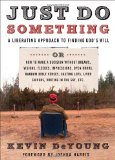 I’ve been reading Just Do Something: A Liberating Approach to Finding God’s Will or How to Make a Decision Without Dreams, Visions, Fleeces, Impressions, Open Doors, Random Bible Verses, Casting Lots, Liver Shivers, Writing In the Sky, Etc. by Kevin DeYoung. I picked it up at a recent conference, not because I have trouble with decision-making, but because I’m a sucker for a catchy title (there’s a lesson there for publishers).
I’ve been reading Just Do Something: A Liberating Approach to Finding God’s Will or How to Make a Decision Without Dreams, Visions, Fleeces, Impressions, Open Doors, Random Bible Verses, Casting Lots, Liver Shivers, Writing In the Sky, Etc. by Kevin DeYoung. I picked it up at a recent conference, not because I have trouble with decision-making, but because I’m a sucker for a catchy title (there’s a lesson there for publishers).
It’s a solid little book that takes a serious look at the harm done by indecision, waffling, inconsistency, and the unwillingness to just put a hand to the proverbial plow and get moving. Spiritualizing indecision and inaction may make it more socially acceptable, but it doesn’t make it a more effective life strategy. Just Do Something is more than just a title, it’s a strategy that works.
How does this book relate to writing and escaping the slush pile? Take a minute to read Stephanie Blake‘s inspiring blog post, “How I (Finally) Got a Book Plucked From the Slush Pile,” to get a good look at exactly what “just do something” looks like in the writing world. Stephanie chronicles a year by year saga of her long road to publication heaven, and the thing that stands out is that she simply kept doing something.
Like many unpublished writers, she learned through the process–through slammed doors, frustrating rejections, and tantalizing “almosts.” She went to conferences, worked with agents, did revisions, and did it all again and again. She didn’t wait for the stars to align, for approval from others, or for anything else before she started sending out her work. She sent and sent and sent. She revised. She sent some more. Finally the miracle happened, and The Marble Queen was plucked from the slush pile and accepted.
If she hadn’t written this blog post, there would have been unpublished writers who commented enviously about luck and overnight success and people who get all the breaks (I know, I’ve heard all that– many times, and if you’ve been through Lucky Freelancer coaching with me, you’ll know exactly how to turn those excuses upside down). There’ll probably still be writers who say things like that, but that’s because they’re not out there doing something. They’re just a little too busy–way too busy–to do all that sending and revising and resending, but one day, just watch, they’ll get the call too. Or not.
The fact is that just do something is the key to almost everything. The book is good too. I’ll be sharing it, so don’t be offended if I send it your way. Just do something!

 What’s worse than sitting down at the typewriter and not being able to think of anything to write? Sitting down to write, finding your words flowing easily and well, then being interrupted by a phone call that completely derails your train of thought.
What’s worse than sitting down at the typewriter and not being able to think of anything to write? Sitting down to write, finding your words flowing easily and well, then being interrupted by a phone call that completely derails your train of thought.